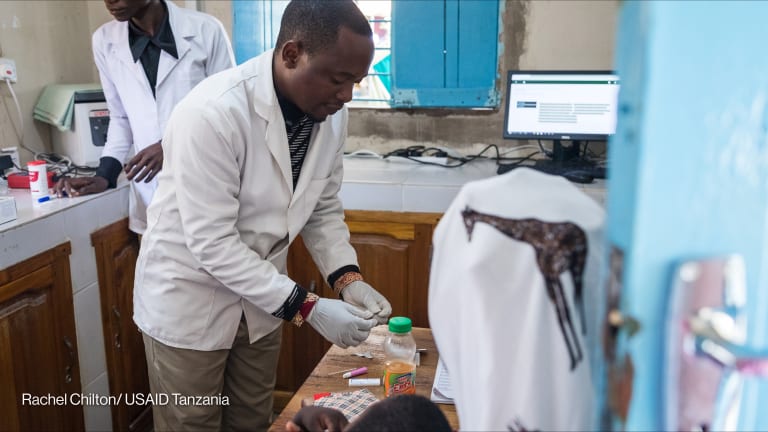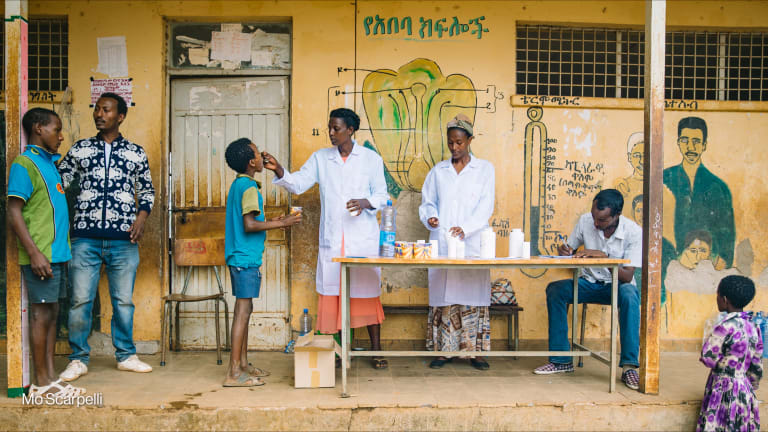
Moving toward universal health coverage requires strengthened health systems. What resources, partnerships, and innovation do we need to reach UHC by 2030? Devex discussed this on November 2 in a Twitter chat organized as a part of our Healthy Horizons content series.
These panelists and other organizations took part in the conversation:
• Thomas Cueni, director general, International Federation of Pharmaceutical Manufacturers & Associations (participated in the chat as @IFPMA)
• Julie Lyn Hall, director of health and care, International Federation of Red Cross and Red Crescent Societies (participated in the chat as @JHallIFRC)
• Luc de Clerck, strategy and new business development manager, Philips Healthcare Africa (participated in the chat as @Luc_clerck)
• Stefan Peterson, chief of health, UNICEF (participated in the chat as @stefanswartpet)
• Agnés Soucat, director for health systems, governance and financing, World Health Organization (participated in the chat as @asoucat)
Below are some highlights from the online conversation.
• @IFPMA Crucial to focus on cost-effective solutions. Invest in immunization & workforce. Equitable access requires transformation in how health services are funded, managed & delivered #HealthyHorizons
• @stefanswartpet By focusing on women, children & disadvantaged in design of UHC benefits and delivery strategies. This strengthens for all! #HealthyHorizons
• @JHallIFRC If we want to reach the SDGs, we must prioritize health & WASH for vulnerable people affected by disasters & crises. This means investing in local capacity, strong partnerships, expanding gov reach, essential health services and lifesaving medicines & equipment for remote communities to improve quality of care & enable community ownership #HealthyHorizons
• @H_S_Global Focus on primary health care and preventive public health #HealthyHorizons
• @HealthPoverty We must start with structural changes to systems e.g. tax & trade to give countries more money to invest in health systems #HealthyHorizons
▶ See all the answers for question one here
• @stefanswartpet We need social innovation more than new products or technologies! Innovate in delivery systems to reach most marginalized #HealthyHorizons
• @Luc_clerck Innovative ways of working with MOH and PPP and using technology makes UHC affordable #HealthyHorizons
• @IFPMA For UHC and public health care to be cost-effective, preventive care is essential. #HealthyHorizons
• @HealthPoverty By focusing on innovation we miss the key question - how can poorer countries fund UHC? This requires structural changes #HealthyHorizons
• @NovartisFDN Digital health can increase social equity, economic growth & environmental sustainability - foundations for UHC #HealthyHorizons
▶ See all the answers for question two here
• @asoucat Focus on supporting local heath workers including ensuring their security and financial compensation. Focus on ensuring continuity of basic services, particularly primary health care and basic surgery #HealthyHorizons
• @JHallIFRC Our 14M+ IFRC #VolunteersActFirst in any disaster providing water, sanitation & trauma care. Even in the most difficult contexts, improved health outcomes are possible. We need strong local action, WASH, vaccines & medicines #HealthyHorizons
• @IFPMA Prevention is key. With @CEPIvaccines we're taking measures to predict future epidemics & vaccines. Resilient health systems are key to preventing future crises. Partnerships can help achieve this #HealthyHorizons
• @Luc_clerck Philips help first responders through education & simple adapted technology in Backpack for sensibilization & prevention #HealthyHorizons
• @H_S_Global We need to learn lessons from crises to prepare for future challenges #HealthyHorizons
▶ See all the answers for question three here
• @IFPMA We encourage governments to explore working through public-private partnerships focused on a wide range of areas. We partner with 300+ multi-stakeholder partnerships in LMICs. 230 are involved in Africa. #HealthyHorizons
• @asoucat UHC is a complex endeavor. It is a social contract. Hence it needs all segments of society to come together #HealthyHorizons
• @stefanswartpet Governments are key, as is civil society, with private sector doing socially responsible business #HealthyHorizons
• @Luc_clerck Partnership help to complement expertise, share risks & responsibilities to achieve the benefits of UHC #HealthyHorizons
• @UHCPartnership Better coordination among partners is indispensable for UHC. Bringing interests together – with people at the core center! #HealthyHorizons
▶ See all the answers for question four here
• @asoucat UHC investments will mostly come from domestic financing at country level. Aid represents 0.5% of global health expenditures; 5% in LMICs. No country has reached UHC without significant levels of collective/public financing. UHC requires financial solidarity with subsidy from wealthy to poor and from healthy to sick #HealthyHorizons
• @IFPMA UHC is a political choice. It's responsibility of every country & national gvt to pursue it. Recent @WHO study suggests that 85% of funding gap to achieve UHC could be met by countries #HealthyHorizons
• @stefanswartpet Domestic resources already biggest part, much out of pocket. Increase gvt contribution, pool private, add global transfers #HealthyHorizons
• @Luc_clerck Hybride financing by donors, compagnies, government & investors and PPP’s are required to fund UHC #HealthyHorizons
• @JHallIFRC World’s poorest nations will have 54B USD annual gap & need external assistance to achieve the SDG health targets. UHC starts with strengthening primary health care services – this is the first place vulnerable communities go to. Money to strengthen primary health care systems requires public & private sectors to invest. It also requires governments to commit political will and legal reform for access to quality healthcare for all #HealthyHorizons
▶ See all the answers for question five here
• @stefanswartpet High level political commitment, countries realizing investing in people key to sustainable growth #HealthyHorizons
• @IFPMA People live 30% longer than their grandparents. Partly thanks to innovation in vaccines & medicines reaching more people. We’re ready to continue working with governments to support new models of health financing & delivery #HealthyHorizons
• @asoucat Over the past decades, health outcomes improved worldwide & poverty declining globally, this trend is likely to continue. But we shouldn’t be complacent – climate change & environmental degradation threaten achievements & destabilize societies #HealthyHorizons
• @JHallIFRC Countless studies clearly show UHC is technically possible & economically feasible, even for low income countries & fragile states. To get to “universal”, we focus on equity: improved health care & saving lives of those who are left behind. Around the world, WASH for 2M+ people and HIV & TB prevention in rural communities are two examples of getting to UHC #HealthyHorizons
• @futurehealthsys Collective action at grassroots level is becoming more networked and crossing national boundaries #HealthyHorizons
▶ See all the answers for question six here
How can we revolutionize primary health care to achieve universal health coverage by 2030? Follow Devex's Healthy Horizons content series on healthyhorizons.devex.com and join the #HealthyHorizons conversation on social media.
The content, information, opinions, and viewpoints in this Healthy Horizons content series are those of the authors or contributors of such materials. Content produced as part of the series does not represent an endorsement of the contributing institutions or their positions, nor does it imply the existence of any relationship or engagement among them in connection with this series.
Search for articles
Most Read
- 1
- 2
- 3
- 4
- 5








